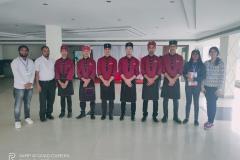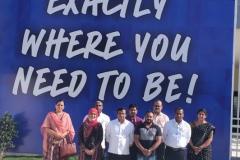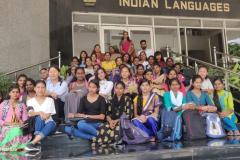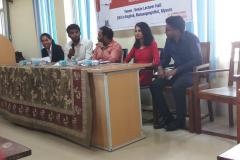
Department of Zoology
Department of Zoology
Department of Zoology is one of the oldest departments of Teresian College, started from the inception of the institution in 1963. The department offers B.Sc degree with CBZ and CZBt combinations. The department is enriched with rare collection of specimens in the museums, well equipped labs and library. The department has qualified, experienced and highly motivated teachers involving themselves in teaching and extension activities. The department strives to promote overall development of students by inculcating a spirit of inquest, discipline and adventure through various academic and co-curricular activities.
Our pedagogy focuses on basic and applied fields of Zoology assisted with demos, models, videos, etc. The departmental laboratories include equipments such as Digital Weighing Balance, pH Meter, Compound Microscopes, stereoisomer, Dissection Microscopes, Water Bath, Electrophoresis Units, Power Pack, Microtome, Centrifuge, and Incubator.
Virtual Lab: Dissection of various animals is demonstrated on computer by using Digifrog software.
Adoption of an animal (Common Langur) at Mysore Zoo.
Courses offered: B.Sc. (CBZ and CZBt)
Zoology Program Outcomes:
- Students gain knowledge and skill in the fundamentals of animal sciences, understand the complex interactions among various living organisms
- Analyse complex interactions among the various animals of different phyla, their distribution and their relationship with the environment
- Apply the knowledge of internal structure of cell, its functions in control of various metabolic functions of organisms.
- Understands the complex evolutionary processes and behaviour of animals
- Correlates the physiological processes of animals and relationship of organ systems
- Understanding of environmental conservation processes and its importance, pollution control and biodiversity and protection of endangered species
- Gain knowledge of Agro based Small Scale industries like sericulture, fish farming, butterfly farming and vermicompost preparation.
- Understand the various concepts of genetics and its importance in human health
- Apply the knowledge and understanding of Zoology to one’s own life and work
- Develop empathy and love towards animals
Program Specific Outcomes:
- Understand the nature and basic concepts of cell biology, genetics, taxonomy, physiology, ecology and applied Zoology
- Analyse the relationships among animals, plants and microbes
- Perform procedures as per laboratory standards in the areas of Taxonomy, Physiology, Ecology, Cell biology, Genetics, Applied Zoology, tools and techniques of Zoology, Entomology, Sericulture, Biochemistry and Immunology.
Course Outcome
Animal Diversity – Invertebrates
- Describe general taxonomic rules on animal classification
- Classify Protista up to phylum using examples from parasitic adaptation
- Classify Phylum Porifera to Echinodermata with taxonomic keys
- Describe Phylum Nematoda and give examples of pathogenic Nematodes
Ecology, Zoogeography and Animal Behaviour:
- Distribution of fauna in different realms of interaction
- Understand Animal behaviour and response of animals to different instincts
- Interaction of biotic and abiotic factors
- Various kinds of Animal adaptations
Animal Diversity – Vertebrates & Developmental Biology:
- Imparts conceptual knowledge of vertebrates, their adaptations and associations in relation to their environment
- Classify phylum Protochordates to Mammalia
- Complex Vertebrate interactions
- Basic concepts of developmental biology
- Gains knowledge about gametogenesis, cleavage mechanisms, gastrulation and role of hormones in metamorphosis and regeneration
Cell Biology, Genetics and Evolution:
- Structural and functional aspects of basic unit of life i.e. cell concepts
- Mendelian and Non Mendelian inheritance
- Concept behind genetic disorder, gene mutations- various causes associated with inborn errors of metabolism
- Theories of Evolution
- Knowledge of eras and evolution of species
Physiology and Biochemistry:
- Seeks to understand the mechanisms that work to keep the human body alive and functioning Physiological and biochemical understanding through scientific enquiry into the nature of mechanical, physical, and biochemical functions of humans, their organs, and the cells of which they are composed
- Interactions and interdependence of physiological and biochemical processes
ANIMAL PHYSIOLOGY
- Students are taught the detailed concepts of digestion, respiration, excretion, the functioning of nerves and muscles
- Students gain fundamental knowledge of animal physiology
- Students gain skill to execute the roles of a biology teacher or medical lab technician with training, as they have basic fundamentals
Entomology:
- Imparts knowledge of beneficial and non-beneficial insects
- Knowledge of how they interact with their environment, other species and humans
- Classification of Insects
- Role of insects in spread of diseases
Immunology:
- Imparts indepth knowledge of tissues, cells and molecules involved in host defence mechanisms
- Understanding types of immunity
- Interactions of antigens, antibodies, complements and other immune components
- Understanding of immune mechanisms in disease control, vaccination, process of immune interactions
Environmental Biology
- Imparts knowledge to the student regarding environment and conservation biology.
- Gains knowledge in the areas of responses to Laws of limiting factor, Laws of minimum, Laws of Tolerance and Tragedy of commons
- Types of ecosystem – freshwater, marine and terrestrial.
- Population characteristics and dynamics – conceptual approach
- Growth curves and pyramids; sigmoid curve, J curve and hyperbola; logistic equation and concepts relating to growth.
- The students will be well equipped to become very competent in research or teaching fields after completion of this course.
Biostatistics:
- Biostatistics teaches them to use the best data analysis methods
- Students gain knowledge about statistical methods like measures of central tendencies, Probability.
The Department of Zoology was established with an aim to provide quality education to students and to contribute for the development of animal sciences and zoological studies. The Department places emphasis on laboratory component in the teaching curriculum and extension activities. The Department regularly organizes Seminars, Guest Lectures, educational trips to wildlife sanctuaries and national parks, various competitions etc. We focus on student centric learning by organizing student seminars and poster presentations on the topic related to environment, biodiversity and conservation.
A graduate degree in Zoology opens a vast range of career opportunities in the field such as Teaching and Research, Forensics, Indian Forest Services, Zoo curators, Museum Curators, animal and Wildlife educators, Wildlife rehabilitators and Conservators, Research Projects and in higher specialized studies. The career opportunities for a post graduate in Zoology are limitless. Some of the employment areas which provide huge openings for the Zoology candidates are medical laboratories, wildlife rehabilitation centers, hatcheries, agricultural departments, museum services, conservation agencies, scientific civil services, environment or ecosystem management sector, environmental consulting firms, and so on. In addition, there are numerous opportunities in the field of research in India and abroad.
Vision:
Envisions to inculcate the values of life, science education, respect for nature and concern for ethical values among students through good scientific educational practices.
Mission:
- To impart to the students the contemporary advancements in life sciences.
- To get expertise /skills in techniques of biological sciences.
- To bring about an awareness regarding nature, biodiversity and conservation of animals.
- To establish peaceful environment and life for community and society.
Name :Mr. VIVEK CHARLES
Designation : Assistant Professor & HOD
Qualification : M.Sc., M.Phil. KSET
Teaching Experience : 06 years
Research Experience : 04 years
Specialization : Vector Biology, Applied Zoology, Biocontrol
Name : Ms. KAVITHA R. S.
Designation : Assistant Professor
Qualification : M.Sc.,B.Ed., KSET
Teaching Experience : 08 years
Specialization : Cell Biology and Genetics
- Results for the past five years were excellent. The department has secured 100% results.
- Hurmine Ridha of III B.Sc., CZBt (2016-2017) Scored 995 out of 1000 Marks in Zoology. Topper in the University of Mysore. She was invited as a guest of honour by the honourable Prime Minister of India to witness the Republic Day Parade in 2018 from Prime Minister’s box, Rajpath, New Delhi.
- Many Students have secured 100/100 in Zoology papers.
- 70% of passed out students join P.G courses
| Sl. No. | Dated | Name of Programme |
| 1 | 08-05-2020 | Animal Adoption at Sri. Chamarajendra Zoological Garden, Mysuru. 08-05-2020 to 07-05-2021 (Period of adoption One Year) |
| 2 | 23-10-2020 | Advance Trends and Perspectives in Molecular Biology and Genetics |
| 3 | 14-02-2021 | National Science Day Celebration 2021: Online Quiz Competition |
| 4 | 20-02-2021 | Field visit to Speciality Veterinary Hospital |
| 5 | 01-03-2021 | National Science Day 2021 |
Mr. Vivek Charles
Assistane Professor & HOD,
Department of Zoology,
Teresian College,
Siddarthanagar,
Mysuru – 570011.
Mob : 9916731475
E-Mail : charlesvbrl@gmail.com

- Teresian College Bannur Road, Siddarthanagar, Mysuru 570011
- Phone 0821-2471316
- Email: administrator@teresiancollege.ac.in
























